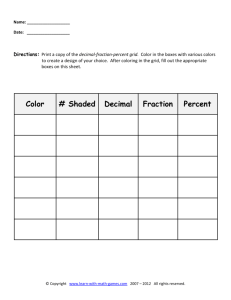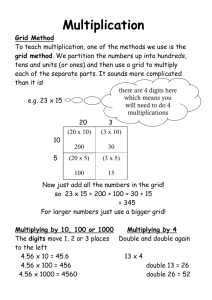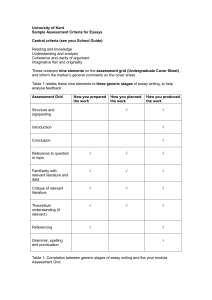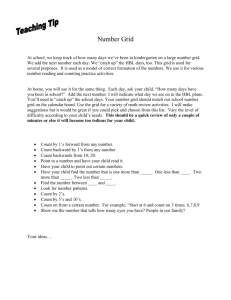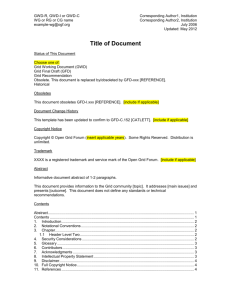see the report - Mpho-Entle
advertisement
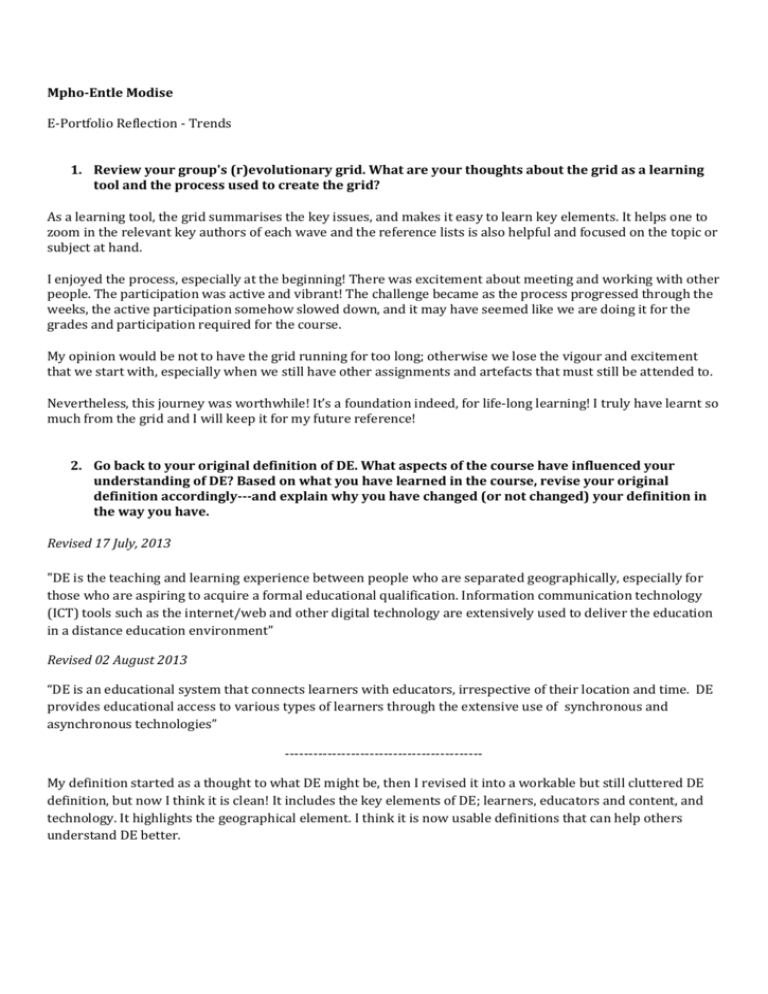
Mpho-Entle Modise E-Portfolio Reflection - Trends 1. Review your group's (r)evolutionary grid. What are your thoughts about the grid as a learning tool and the process used to create the grid? As a learning tool, the grid summarises the key issues, and makes it easy to learn key elements. It helps one to zoom in the relevant key authors of each wave and the reference lists is also helpful and focused on the topic or subject at hand. I enjoyed the process, especially at the beginning! There was excitement about meeting and working with other people. The participation was active and vibrant! The challenge became as the process progressed through the weeks, the active participation somehow slowed down, and it may have seemed like we are doing it for the grades and participation required for the course. My opinion would be not to have the grid running for too long; otherwise we lose the vigour and excitement that we start with, especially when we still have other assignments and artefacts that must still be attended to. Nevertheless, this journey was worthwhile! It’s a foundation indeed, for life-long learning! I truly have learnt so much from the grid and I will keep it for my future reference! 2. Go back to your original definition of DE. What aspects of the course have influenced your understanding of DE? Based on what you have learned in the course, revise your original definition accordingly---and explain why you have changed (or not changed) your definition in the way you have. Revised 17 July, 2013 "DE is the teaching and learning experience between people who are separated geographically, especially for those who are aspiring to acquire a formal educational qualification. Information communication technology (ICT) tools such as the internet/web and other digital technology are extensively used to deliver the education in a distance education environment” Revised 02 August 2013 “DE is an educational system that connects learners with educators, irrespective of their location and time. DE provides educational access to various types of learners through the extensive use of synchronous and asynchronous technologies” -----------------------------------------My definition started as a thought to what DE might be, then I revised it into a workable but still cluttered DE definition, but now I think it is clean! It includes the key elements of DE; learners, educators and content, and technology. It highlights the geographical element. I think it is now usable definitions that can help others understand DE better. 3. Consider the overall course objectives (see the Course Syllabus). Were all or most of these objectives achieved? If so, in what ways and to what degree? Course Objectives: Level of achievement (1 to 10) Identify the unique characteristics of distance education Describe the major influences in the evolution of distance Having been my first encounter with the DE content, I think this objective education --social, economical, and political-- from its early have been achieved, I now understand DE better and am able to engage in a constructive ‘learnt’ manner in DE discussion with the OMDE class and in my beginnings to the current IT-based practices Overall level of achievement is 10, with variances in some objectives. workplace. Identify the key authors and theorists in distance education I believe I still have a lot more to read and study and be able to contextualise and analyze their contributions to the field Describe how distance education methodologies have changed over time, in particular how the role of teacher and learner have evolved Describe various types of distance education institutions and the relevance of a systems approach to teaching and learning Analyze the impact of technological changes on the nature of teaching and learning in distance education I am 100% comfortable using technology, I am ready to try new things and I my general view about DE, but thus far I know a few key authors and theories, circumstances that led to the establishment of certain universities, and theories that helped maintain the status quo or even change it within the DE world. I also understand the various types of instructions and the relevance of system approach to teaching and learning, how the roles of teachers and learners alike are changing and some of the factors that led to these changes. believe in a trial-and error approach when it comes to technology. We learn by doing and doing until we get it right!! Navigate and use an online learning environment, shared virtual spaces, and social media for the purpose of learning, documenting learning, and creating content (e.g., learning Working with people is a skill that I always have but not in an e-learning management system, maps, charts, wikis, Google docs, environment and I have enjoyed it! Weebly, Twitter, blogs, Diigo, Vimeo) Master and apply research and writing skills for the purpose of critically analyzing issues and topics discussed in relevant literature, synthesizing findings, and communicating ideas and arguments with supporting evidence Learn collaboratively by using social media and other shared virtual spaces to create content and successfully complete assigned team projects My thinking and feeling have changed drastically, I am more open now, I think at the beginning I was a bit unconvinced about Peters industrialization theory and I just didn’t like the way my classmates were all ‘drooling’ over this theory, but with more reading on the theory and in comparison with other theories I realised its value and contribution to DE (hope I won’t be penalized for being this brutally honest!! ) I think I will be more student-centred in my thinking and behaviour from now on, actively aware that I am here to serve the needs of my clients –students! Reflect on learning and articulate changes in thinking, feeling, behavior 4. Take some time to reflect on your study group experience: What did you think about the experience of working together to create a collaborative document? Honestly it was fun!! Very rewarding and plain fun!!! What worked? Our activity log helped! It worked as a tool to monitor contribution among members, it also assisted us in making sure that we all participated and recorded what each did, when and sometimes we even gave details on how one did something, and we also used this as a communication tool to ask for help, to assist others and to motivate each other. Also exchanging roles for submission somehow helped because then it gave us the feeling of equality, while at the same giving each one to be a ‘leader’ for a period. What did not? I’m not sure how this can be done, because the schedule is linked to the weekly Skill builders, weekly milestone/objectives, but the time spent doing collaborative work should not be extended or be too long, as we tend to lose the vigour that we start with. What could your group have improved in order to realize a more smooth process? I think we honestly worked smoothly, and the LEO group workspace also works wonders! Our group was the best, I was never made to feel less important or inferior to anyone, my suggestions were taken, my contribution also appreciated, we had a great team! What do you see as benefits (or drawbacks) of online collaboration? Benefits are more than drawbacks, we get to learn from various viewpoints, different cultures, thinking and knowledge from various countries brought together in one room, there can only be more benefits! It’s like a meeting place for the students from the developed and developing countries, more like west meet east! How do you think the activity could be improved? Maybe if you reduce the time, not sure how.

